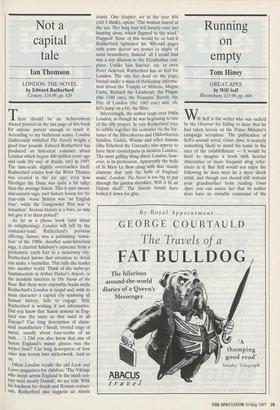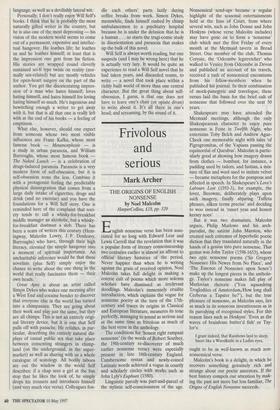Running on empty
Tom Hiney
GREAT APES by Will Self Bloomsbury, £15.99, pp. 404 ill Self is the writer who was sacked by the Observer for failing to deny that he had taken heroin on the Prime Minister's campaign aeroplane. The publication of Self's second novel, Great Apes, is scarcely something likely to mend his name in the eyes of the establishment — it would be hard to imagine a book with heavier obscenities or more frequent drug refer- ences in it. But Self would not enjoy the following he does were he a mere shock artist, and though you should still restrain your grandmother from reading Great Apes, you can assure her that its author does have an enviable command of the language, as well as a devilishly lateral wit.
Personally, I don't really enjoy Will Self s books. I think that he is probably the most naturally gifted writer in the country, but he is also one of the most depressing — his vision of the modern world seems to come out of a permanent, expensive and intellec- tual hangover. He loathes life; he loathes us and he loathes himself; at least that is the impression one gets from his fiction. His stories are wrapped round cleverly sustained sci-fi type twists on reality (nor- mally sex-related) but are mostly vehicles for open-heart surgery on the part of the author. You get the disorientating impres- sion of a man who hates himself; loves hating himself, and hates himself for loving hating himself so much. He's ingenious and bewitching enough a writer to get away with it, but that is all that one is really left with at the end of his books — a feeling of emptiness.
What else, however, should one expect from someone whose two most visible influences are Franz Kaflca, whose most famous book — Metamorphosis — is a study in urban paranoia, and William Burroughs, whose most famous book — The Naked Lunch — is a celebration of drugs-induced paranoia. Paranoia is a very modern form of self-obsession, but it is self-obsession none the less. Combine it with a protagonist feeling the predictable physical disintegration that comes from a large daily intake of cigarettes, drugs and drink (and no exercise) and you have the foundations for a Will Self story. One is reminded here of the complaint that soci- ety tends to call a whisky-for-breakfast middle manager an alcoholic, but a whisky- for-breakfast dustman a slob. There has been a seam of writers this century (Hem- ingway, Malcolm Lowry, J. P. Donleavy, Burroughs) who have, through their high literacy, elevated the simple hangover into a moment of spiritual importance. An uncharitable inference would be that these novelists (plus Self) simply enjoy the chance to write about the one thing m the world that really fascinates them — their own heads.
Great Apes is about an artist called Simpn Dykes who wakes one morning after a West End and cocaine bender to discover that everyone else in the world has turned into a chimpanzee. They are going about their work and play just the same, but they are all chimps. This is not an entirely origi- nal literary device, but it is one that Self pulls off with panache. He relishes, in par- ticular, describing the entirely natural dis- plays of casual public sex that take place between consenting strangers in chimp- land (on the underground, in the super- market) as well as sharing with us a whole catalogue of scatology. All bodily taboos are out the window in the world Self describes: if a chap sees a girl at the bus stop that he likes the look of, he simply drops his trousers and introduces himself (and very much vice versa). Colleagues fon- dle each others' parts lazily during coffee breaks from work. Simon Dykes, meanwhile, finds himself rushed by chimp ambulancemen to a psychiatry hospital because he is under the delusion that he is a human . . . so starts the tragi-comic study in disorientation and paranoia that makes up the bulk of this novel.
Will Self is always worth reading, but one suspects (and I may be wrong here) that he is actually very lazy. It would be quite an experience to read a Will Self novel that he had taken years, and discarded reams, to write — a novel that took place within a richly built world of more than one central character. But the great thing about self- obsession, I guess, is that one does not have to leave one's chair (or opiate divan) to write about it. It's all there in one's head; and screaming, by the sound of it.



































































 Previous page
Previous page